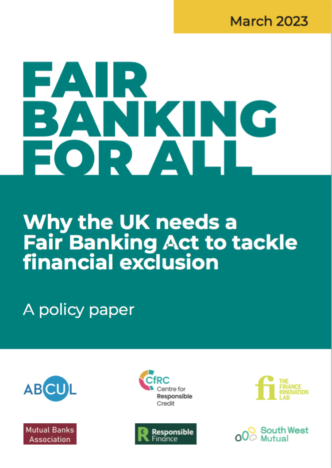 27 March 2023: A large majority of the UK public would back a proposed ‘Fair Banking Act,’ according to findings from a new poll by Opinium Research for the Fair Banking for All coalition.
27 March 2023: A large majority of the UK public would back a proposed ‘Fair Banking Act,’ according to findings from a new poll by Opinium Research for the Fair Banking for All coalition.
The coalition includes Responsible Finance, organisations working to tackle financial exclusion, campaigners and academics. Its new policy paper ‘Fair Banking for All: Why the UK needs a Fair Banking Act to tackle financial exclusion’ is published today.
The report outlines the evidence of this growing financial exclusion crisis, and what steps can be taken to address it. Key research findings:
- 68% of people in the UK think it’s unfair that some people get different levels of service from banks because of their status or background.
- Nearly 7 in 10 would support a new law that forces banks to report on how equally they provide services to people from different backgrounds or status.
The proposed new Fair Banking Act would:
- Require mainstream banking institutions to report on their performance on financial exclusion, through a transparent, publicly available, framework.
- Create a system for clear ratings, showing which banks are doing well and which need to improve, improving market incentives and regulation.
Access to vital services such as affordable lending, cash and local bank branches has become an increasing political issue as pressure has grown on personal finances over the last year. With savings depleted by rising costs and inflation, this ‘financial exclusion’ is an issue for millions of people and is experienced in many ways.
For instance, a lack of ethical and affordable lending provision means millions of people are turning to borrowing from very expensive credit providers. One estimate in 2022 put the number of people in England forced to use dangerous illegal lenders like loan sharks at more than a million.
And it’s not just individuals that are affected: too many people can’t access the finance they need to start or grow small or medium sized enterprises (SMEs) or social enterprises. That has a significant knock-on impact on local economies, given SMEs count for most of the private sector employment in the UK.
The impact of current financial exclusion mirrors and exacerbates many fault lines in wider UK society, with people of colour finding it more difficult to access banking services including credit, and Black victims of fraud more than twice as likely as white customers to have refund requests denied.
While efforts to tackle financial exclusion have expanded in recent years, with voluntary schemes introduced by Banks, and government initiatives, it continues to grow, exacerbated by the cost-of-living crisis.
Theodora Hadjimichael, CEO of Responsible Finance, said:
“Already tens of thousands of people, small businesses and social enterprises thrive because a community lender like a CDFI gives them the right support. But financial exclusion shackles millions of individuals and businesses. The evidence from elsewhere is clear: a Fair Banking Act would unleash impact across our communities, society and economy by enabling CDFIs and other social purpose lenders to work more effectively with larger retail banks to tackle financial exclusion.”
Kay Polley, Co-Head of Campaigns at charity the Finance Innovation Lab, a member of the Fair Banking for All campaign said:
“Everyone deserves equal access to advice, fair lending, and services like cash or local bank branches, regardless of their background – it’s basic fairness, and the public clearly agrees. It’s shocking that we don’t even require banks to measure the impact of their actions on individuals and communities, particularly those already disadvantaged. We urgently need a Fair Banking Act to change this picture.”
The call for a Fair Banking Act for the UK is inspired by a similar piece of legislation in the United States: The Community Reinvestment Act. Enacted in 1977, the CRA is attributed with a massive increase in bank funding of financial institutions that specialise in supporting SMEs and lower-income communities, such as credit unions and Community Development Finance Institutions (CDFIs). As an example, in 2020, US banks provided $271 billion to low and moderate income communities, and in 2019, CDFI’s and credit unions managed more than $150 billion, including lending to SMEs.
What next?
- Read the policy paper ‘Fair Banking for All: Why the UK needs a Fair Banking Act to tackle financial exclusion’
- The Fair Banking for All Campaign is a coalition of organisations including Community Development Finance Institutions, credit unions, mutual banks, ethical banks and building societies, charities fighting financial exclusion, expert organisations on financial exclusion, and academics. The coalition is launching a public campaign to drive the Act up the political agenda this year, to get politicians of all colours to take action commensurate with the challenge, starting with introducing a Fair Banking Act.
